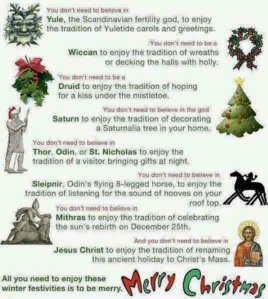I recently made a Facebook post about my acceptance into nursing school (please hold your applause) and referred to the fact that my financial situation is going to be somewhat…difficult. I proceeded this with letting my friends and family know that I would like money for Christmas instead of other gifts. Now, you may ask, “Well, if you’re an atheist, why do you celebrate Christmas?”, to which I would like to respond, “Because I fucking can and its none of your business!”. However, that is rather disrespectful and uncalled for. So when a friend of mine commented the question “Not to be rude, but just curious..why do you celebrate Christmas if you don’t believe in God?”, it took everything in me not to ask, “Why the fuck do you care?! Why do you as a Christian celebrate Halloween?”. I realize though that some people think it is hypocritical and that maybe I and others are just taking advantage of the gift giving season. Plus, I do not think many people realize what the origins of Christmas are, and although I could just say “Google it”, I would like to attempt to explain in great detail where exactly this holiday comes from. I will later answer why I personally celebrate Christmas after I thoroughly dig deep into the origin, meaning and culture of this thing we call Christmas.
1. The Bible Never Mentions Christmas
I’m going to start by looking into the Christian religion itself for answers about Christmas. We know for a fact that the bible never, not once mentions Christmas, or any type of holiday celebrating Jesus’ birth. The holiday did not come with instructions on how to celebrate it, and it certainly did not come with a list of rules including who is allowed to take part in it. The only instructions I can find regarding Christmas is in the rituals. For instance:
Jeremiah 10:2 KJV Thus saith the LORD, Learn not the way of the heathen, and be not dismayed at the signs of heaven; for the heathen are dismayed at them. 3* For the customs of the people are vain: for one cutteth a tree out of the forest, the work of the hands of the workman, with the axe. 4* They deck it with silver and with gold; they fasten it with nails and with hammers, that it move not. 5 They are upright as the palm tree, but speak not: they must needs be borne, because they cannot go. Be not afraid of them; for they cannot do evil, neither also is it in them to do good.
This is clearly saying not to have a tree cut out of the forest and put in the home as it is seen as a false idol. Of course, you don’t see Christians up in arms trying to get rid of the Christmas tree tradition. Mostly because of cognitive dissonance, but also because it has been a part of their Christmas for years, why change it now? In addition, many Christians claim that this verse is referring to the tree stump being carved into an idol, not the entire tree itself. To me, it really does not matter which the verse is referring to. Either is a false idol. Period.
Another discrepancy over celebrating Christmas comes from Exodus 32:5-7.
5 When Aaron saw this, he built an altar before it. Then Aaron called out: “There is a festival to Jehovah tomorrow.” 6 So they got up early on the next day and began offering up burnt offerings and presenting communion sacrifices. After that the people sat down to eat and drink. Then they got up to have a good time.7 Jehovah now said to Moses: “Go, descend, because your people, whom you led up out of the land of Egypt, have corrupted themselves.
According to many biblical scholars and many Christians for that matter, this verse is citing gods dismay over being worshiped in a way he does not like. God is offended by some worship that he does not approve of. Since Christmas is not mentioned in the bible and we are not instructed to celebrate it, does that mean that God did not intend for us to celebrate it? Are we insulting him or offending him by this celebration?
2. Jesus was not born on December 25th.
The date that Christmas is celebrated on is not accurate as the date of Jesus’ birth is not known. It is estimated that he was born in September. According to the bible, shepherds were out watching over their sheep, which would not happen on a cold winter night so we know he was not born in December. If Jesus was not born on December 25th, why was that day chosen?
If we look into paganism, in ancient Babylon we will find that another Son was celebrated. The Son of Isis, or the Goddess of Nature. This celebration included feasting, gift-giving, drinking and partying. Sounds similar to a modern-day Christmas party! In Rome, many years before the birth of Jesus, they also had a winter celebration. Romans celebrated Saturnalia, honoring Saturn the god of agriculture. They also had a celebration in January, which represented the triumph of life over death. This whole season was called Dies Natalis Invicti Solis, the Birthday of the Unconquered Sun. How convenient that Christianity has something similar, except, “sun” is now “son. Hmm.
In short, we can see why December was chosen as the date for Jesus’ birth. It would have been an easier transition to Christianity if the Pagans got to keep their holiday, and just name it something else. This is how many of the rituals and traditions were brought from Paganism into Christianity, because it was essentially the same holiday with a different name. Pagans could still incorporate their rituals and beliefs into the new holiday, which they passed down and this is why we celebrate Christmas with feasts, parties and gifts. Essentially the only difference between Saturnalia and Christmas is the god that you worship. Everything else is Pagan.
3. The traditions are not Christian.
I’ve mentioned Christmas trees but there are many other traditions that Christians like to claim as a religious ritual that others should not perform unless they believe in the Christian god. Here is a list of a few with explanations of each.
- Christmas Trees. Druids were known to worship huge trees and they were seen as a religious symbol. Egyptians, Romans, Vikings, and Celts all with differing beliefs, brought evergreen into their homes as some sort of symbol. For the Celts it was a symbol of everlasting life. Egyptians brought evergreen into their homes in honor of their sun-god, Ra, as a symbol of life overcoming death. In the United States, Christmas trees were seen as a pagan symbol and not totally accepted until the late 1840’s. Clearly, not a Christian thing.
- Mistletoe. Mistletoe was hung by Druids as a promise of the suns return, as the days were shorter many thought the sun was sick. The ritual of kissing under the mistletoe was a fertility ritual.
- Caroling. In ancient Rome, there were groups of entertainers called Mummers. These people were costumed singers and dancers who went from house to house entertaining their neighbors. Thus, caroling was born.
- Gift-giving and feasting. I think I’ve already explained this one but we can review. Saturnalia, the Roman holiday, consisted of no work, drinking, eating, and giving gifts. When the birth of Jesus was made a holiday in December, it was meant to make it easier for the Pagans to convert. They got to keep their traditions while worshiping a different god. That is what we call compromise.
4. What the heck is with Santa Claus?
Okay, so if you’re going to complain that I am an atheist, yet I celebrate Christmas, then I do not want to see you lying to your children about Santa Claus. He has absolutely nothing to do with modern Christianity or Jesus or god. He is definitely not in the bible and no church that I have ever been to talks about Santa Claus during the Christmas service. Is it not hypocritical to complain about atheists celebrating a so-called Christian holiday, and then as a Christian you tell your children Santa Claus is coming to give them gifts? What does that have to do with religion? Do not say it is just tradition because that is a fallacy.
Santa Claus, or Saint Nicholas, the bishop of Myra, was known for his generosity and his devotion to children. His reputation gave rise to claims that he could perform miracles after his death. Devotion to him increased and he became Russia’s patron saint. In Greece, he is the patron saint of sailors, in France he was the patron of lawyers, and in Belgium the patron of children and travelers. Eventually, in the 12th century after thousands of churches were dedicated to St. Nick, they devoted a holiday to him, feasting and giving gifts. After the reformation, many of the St. Nick devotees dwindled. In Holland, however the tradition was kept alive. Dutch children would leave their shoes by the fireplace and Sinterklaass would leave them treats if they were good. Dutch colonists brought this to America where the Anglican name Santa Claus emerged.
Once again, not in the bible, not instructed by god to celebrate, not Christian.
So why exactly are Christians claiming Christmas as a Christian only holiday if all of the traditions are from other religions? Within the next few weeks I will post part two of this Christmas origins blog.
This has been part one of my Christmas origins blog. I haven’t decided how many parts there will be, but probably just two. At this point I feel I have already given plenty of information as to why Christmas is not inherently Christian, nor has it ever been. Nonetheless, there is plenty more I would like to discuss so I will have at least one more blog in regard to this topic. Next time I will discuss the outlaw on Christmas, further discussion on Christmas traditions, such as candy canes, the commercialization of Christmas and I will finally discuss why, as an atheist, I celebrate Christmas. Thanks for reading!





I agree with you on this. It’s not a Christian only holiday. Christmas has been commercialized and it’s simply an extra day off in the year. My family does not set up the tree anymore or give gifts. We use it to personally remember Jesus’ birth and that’s all that matters.
In my country, we have a lot of celebrations because of the diversity in race and religion. Everyone celebrates everything, if you want to. Maybe it’s the culture here, but we don’t go questioning people why they celebrate what they celebrate.
LikeLiked by 1 person
I feel the same, I don’t care what people celebrate! It really got to me though when I was asked why I celebrate something that has origins in so many other religions! I’m curious as to what county you live in?
LikeLike
I live in Malaysia 🙂 Where we have so many holidays because of the number of celebrations that occur all year round. Just recently, Deepavali has graced my night sky with fireworks for a few days in a row. Haha!
LikeLiked by 1 person
Very cool!
LikeLike
Haha! It kinda is 🙂
LikeLike
Good reflections. As one who was born on Christmas Day, who was “destined” to be a believer but left. . .you may be interested in my annual reflections at http://www.christmasbaby.wordpress.com. Nothing like these “special seasons” to bring out the wondering! Thanks.
LikeLiked by 1 person
Thank you! I will check it out!
LikeLike
Awesome post!
LikeLike